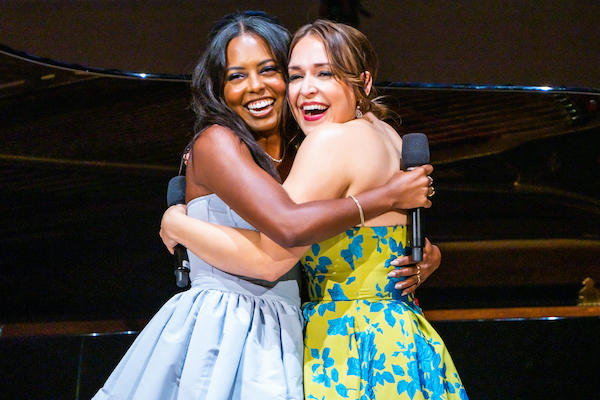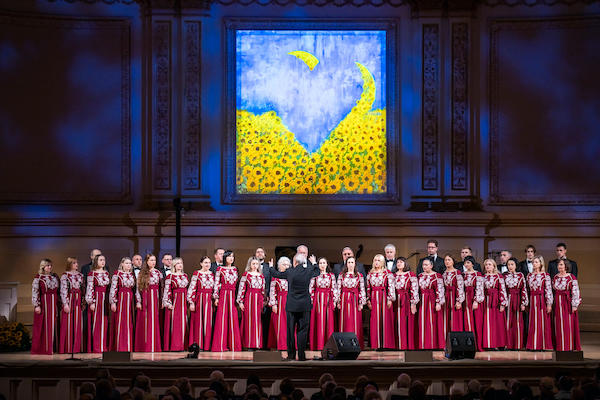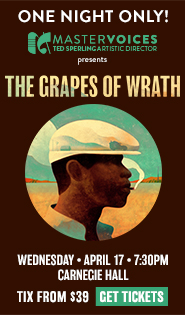Stars come out for a humanitarian night of music at Carnegie’s “Concert for Ukraine”

You could almost hear Carnegie Hall’s Rolodex whirring as it spun out an all-star cast to perform in Monday night’s “Concert for Ukraine,” with all proceeds going to humanitarian aid in that war-ravaged country.
Luminaries of the classical, jazz, pop and Broadway worlds flashed across Carnegie’s stage in brief appearances to support the cause. The somber reason for the concert forestalled any gala atmosphere; the performers mostly left their high C’s and flashy cadenzas at home, opting instead for music of inspiration or gentle yearning. (Chris Thile did pluck a few Paganini riffs on his mandolin, much to the audience’s amusement.)
The event got under way with Ukraine’s national anthem, dating from the 19th century (first line: “The glory and freedom of Ukraine has not yet perished”) and heartily sung by the Ukrainian Chorus Dumka of New York under the direction of Vasyl Hrechynsky.
There is no benefit event without dignitaries, and the all-stars in this category were present as well, starting of course with Carnegie Hall’s executive and artistic director Clive Gillinson. Words of censure for war and aggression alternated with praise for the healing power of the arts in his welcoming remarks, as well as those of two national representatives at the U.N., Ukraine’s Sergiy Kyslytsya and the United States’s Linda Thomas-Greenfield; an official with the U.N. Secretary General’s office, Earle Courtenay Rattray; and, on video, Ukraine’s elegant First Lady, Olena Volodymyrivna Zelenska.
Then Richard Gere, an actor long associated with humanitarian causes around the globe, was summoned to emcee (at last) the musical program. Saying “This will be our reply to violence,” he introduced a piano quintet comprising members of Ensemble Connect, Carnegie’s developmental program for young professional musicians, to play Ukrainian Quintet, Op. 42 by the early 20th-century Ukrainian composer Borys Lyatoshyns’kyi, featuring Joanne Kang in the witty, brilliant piano part and a soulful modal melody from first violinist Rubén Rengel.
Mezzo-soprano Denyce Graves was in buttery-smooth voice as she and pianist Bryan Wagorn gave hushed but intense performances of “Swing Low, Sweet Chariot” and H. Leslie Adams’s “Prayer” (text by Langston Hughes).
Stamping his feet to the beat, radio host and musical polymath Chris Thile treated the audience to some fast mandolin picking and a bit of his smoky-toned tenor in Richard Thompson’s “How Will I Ever Be Simple Again.”
Pianist Wagorn wove a rapt mood for soprano Angel Blue’s dreamy performance of “Morgen!” by Richard Strauss. Blue then allowed herself a bit of showing off, finishing “Deep River” not deep, but high and forte, to cheers from the audience.
Though capable of showing off some Paganini chops herself, violinist Midori kept it on the down low in her brief appearance, sensitively phrasing along with Wagorn in Fritz Kreisler’s Rondino on a Theme by Beethoven.
Pianist Sullivan Fortner and singer Cécile McLorin Salvant took an impressionistic jazz turn in Stevie Wonder’s “Visions,” Fortner putting soft sprays of notes under Salvant’s witty, pointed monologue (“No law was ever passed/Somehow all men feel they are free at last…”)
The unsung stars of the evening—Carnegie Hall’s well-drilled stage crew, who did the setup and strike for each of the brief acts in a matter of seconds—now set microphones and filled the back of the stage with chairs and stands. Clearly a change was coming.

But first, the Metropolitan Opera presence was felt again as mezzo-soprano Isabel Leonard joined Wagorn to float out Manuel de Falla’s song “Nana.” It was Leonard herself who made the turn onto Broadway, picking up the mike and smoothly intoning Stephen Sondheim’s “Children Will Listen,” as Wagorn yielded the piano bench to musical director Mary-Mitchell Campbell, leading strings and a rhythm section.
Cabaret star Michael Feinstein completed the transition, headlining a swinging, gospel-style rendition with backup singers of Walter Earl Brown’s “If I Can Dream,” the fortissimo ending punctuated by the evening’s only snap lighting change.
Adrienne Warren, who has collected about every award this side of the Nobel Prize for her portrayal of Tina Turner on Broadway and the West End, dialed the heat down Monday night for the pianissimo opening of “The Impossible Dream (The Quest)” from Man of La Mancha, but finished high and strong, to loud applause.
Jessica Vosk’s performance traced a similar arc, as the sometime witch from Wicked, free at last from her green makeup, built Benj Pasek and Justin Paul’s “A Million Dreams” from a childlike chirp to a pop wail. Then Warren joined her onstage for an ear-buzzing, high-octane duet in the rapturous “The Prayer” by Carole Bayer Sager.
After the indefatigable crew rolled one Steinway grand to the side and rolled in a different one, violinist Itzhak Perlman rolled onstage himself, followed by a smiling Evgeny Kissin, to a storm of applause. Accompanied by the Russia-born (and Jewish, as Kissin emphasized in a program note about Russian xenophobia) pianist, Perlman reprised his performance of the Schindler’s List movie theme by John Williams, complete with evanescent last high note, and the applause roared again.
As Perlman departed, Kissin remained onstage, applauding his colleague, as if expecting him to return for another bow. Instead, crew members came out and cleared chairs and stands. (Multiple bows would surely have prolonged this intermission=less program from two hours to three.) Alone onstage at last, Kissin sat down at the piano.
Having already played Chopin’s “Heroic” Polonaise in A-flat during his Carnegie recital three nights before, Kissin turned to what might be that composer’s next-most-triumphant piece, the Scherzo in B-flat minor, Op. 31. At ten minutes’ duration, this episodic work was a risky choice to end a long evening of short hits, but Kissin’s intense focus held listeners in thrall, and the scherzo’s blazing coda brought the audience to its feet. Their roar seemed to say, “Now we’re talking Carnegie Hall!”
Emcee Gere stepped to the microphone and quipped, “That’s it. Goodnight.”
But that wasn’t quite it. As the Ukrainian chorus filled the aisles, all the evening’s performers came onstage to sing Leonard Bernstein’s “Somewhere,” a wistful but hopeful tribute to the people of Ukraine.
Carnegie Hall presents “Anne-Sophie Mutter and Friends,” including violinists Mutter and Ye-Eun Choi, violist Vladimir Babeshko and cellist Pablo Ferrández, performing string quartets by Haydn, Beethoven and Jörg Widmann, 8 p.m. Thursday, June 2. carnegiehall.org.




Posted Oct 22, 2022 at 1:55 pm by NANCY KIRKPATRICK
TERRIFIC REVIEW. IT WAS ALMOST LIKE BEING THERE. THANK YOU SO MUCH.